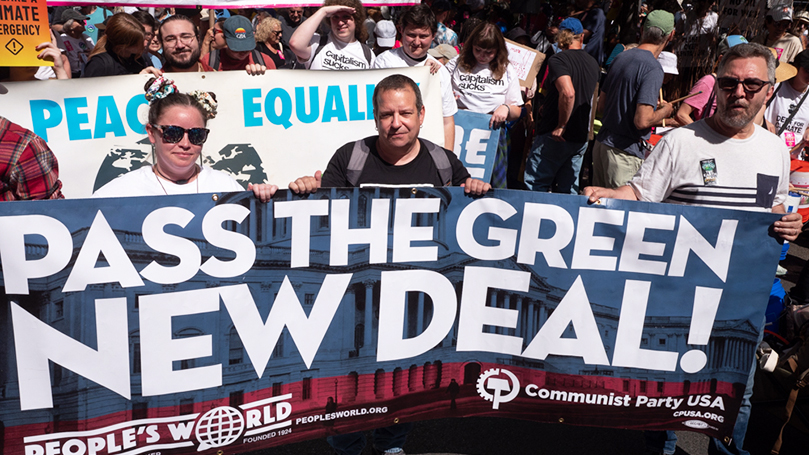
The following report was given by Joe Sims to the CPUSA National Committee meeting on Sunday, December 3, 2023.
With this meeting we begin preparing for our 32nd National Convention. And looking back over the last four years, it promises to be a really great event.
Think about it: We’ve been through a lot since we last gathered in Chicago and have many struggles under our belt — the demonstrations against the war in Gaza, the picket lines against the “Big Three” auto companies and the Hollywood corporations, and the mobilizations to defend abortion and voting rights.
We’ll arrive in Chicago ready to compare notes on these struggles and more, because that’s what conventions do — critically access, and plan ahead. We’ll share our experiences in the struggle for LGBTQ rights and against anti-immigrant hate. We’ll review what we have and have not done in the fight against gun violence and for a safe and clean environment.
On the convention floor and in workshops, we’ll discuss our Cuba solidarity work, the need to step up the fight for a ceasefire in Gaza and Ukraine, and the imperative of strengthening the peace movement and cutting the military budget, as our peace conference demanded we do. We’ll discuss our housing work, the state of the fight to cancel student debt, and where we stand in the struggle against the MAGA right and Trump.
And yes, we’ll discuss the state of the party — its successes and failures, its ideological strengths and weaknesses — with an eye toward building it into the fighting force our working class and people desperately need. We’ll do so inspired by a firm knowledge that we’ve built our party up and down the land in the course of all of these struggles. And therefore, we’ll arrive in Chicago with a song in our hearts, a poem on our lips, chanting, marching, and dancing, in joyous celebration of all we’ve done and all we plan to do.
2024 and the fight for peace and democracy
But first, we’ve got to get through the holiday season and the New Year. And then we have to get ready for the 2024 election, which, in the eyes of some, is almost over, particularly after the Hamas attack and the killing of civilians, and Biden’s support for Israel’s even more horrific counter assault that’s murdered 15,000 more.
But don’t believe the hype, comrades. The election is not over: the anti-MAGA majority has not disappeared. This year’s election victories did occur. There were several, and they were big, up to and including the Virginia legislature and Ohio’s abortion referendum. Local elections for city councils and school boards tell the same story. And that didn’t happen by accident. Motivated by abortion rights and other democratic issues, the people’s movements are alive and well.
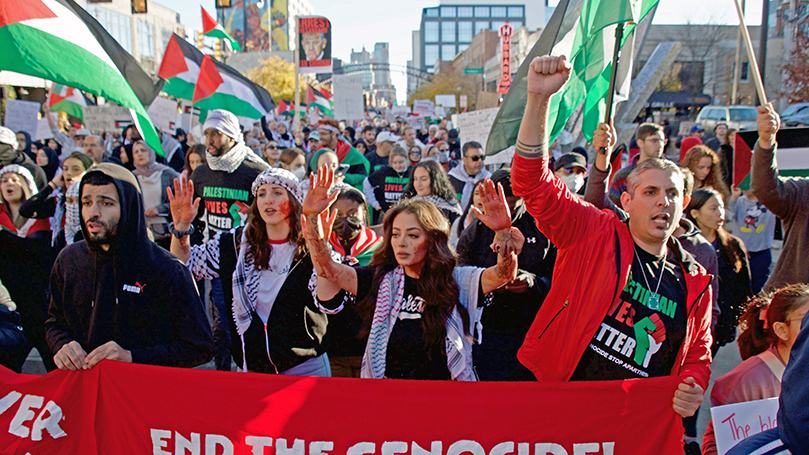
And now a new peace movement is being born before our eyes. Demonstrations initiated by Palestinian youth and joined by young Jews along with people of color have swept the country. A clear two-thirds majority favor a ceasefire, and Congressional support, led by Rep. Cori Bush, is growing.
That said, the administration’s blank check for Israel’s invasion is costing them, how much remains uncertain. A lot will depend on whether the president can be compelled to reverse course. The good news is that things are already beginning to shift. There are even reports of revolt within the administration as hundreds have signed letters protesting its policy. In these circumstances, now more than ever, it’s important to keep the pressure on.
This is particularly important as calls for a ceasefire are being met with intimidation and threats. Opposition to Israel’s policies and Zionism are equated with antisemitism, and under the pretext of fighting it, the crackdown has been severe. Opponents of the war are being fired and doxed. In the name of preventing violence on college campuses, violence is being done to the right of free speech. Student organizations are being banned and protestors suspended, with campus administrations cowing under the pressure and moving to the right. When the center cannot hold and liberals capitulate, free speech and the right to protest are among the first victims. But as our own history demonstrates, it won’t stop there; prison and worse are soon to follow.
That’s why every single firing, suspension, restriction and censure — as in the case of Rep. Rashida Tlaib — no matter how big or small and regardless of its source, should be fought with all the force that can be mustered. That’s what the struggle for democracy is all about — fighting the repression and bans inch by democratic inch.
People don’t like bans, particularly when they’re made aware of the stakes. We saw that ourselves in the early ’60s with the Free Speech Movement that ended our banning from college campuses. We witnessed it again in 2017 in response to Trump’s Muslim ban. The democratic right of expression is a key issue. Our forces on and off campus should jump into this fight with both feet.
Another key issue is the growth in racist, antisemetic, and anti-Arab hate promoted from on high not only by the usual suspects, but more recently Elon Musk. Musk has twice now over the last three months openly aligned himself with fascist hate speech on X/Twitter. The first time, significantly, was a few days after the 60th Anniversary March, where the Civil Rights leadership assembled a broad coalition of Black, Latino, Asian, women, LGBTQ, labor and Jewish movements against racism and in defense of democratic rights. At that time, Musk almost broke X/Twitter by endorsing a post calling for banning the Anti Defamation League (ADL), an organization itself problematic because of its own attempts to ban critics of Israel.
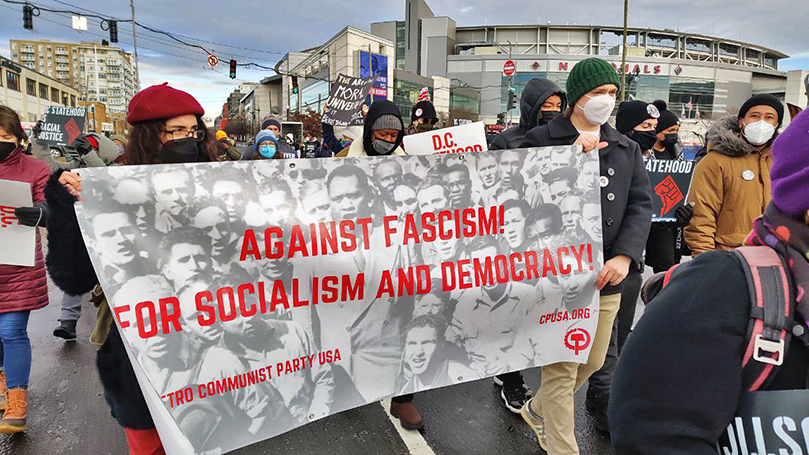
The 2nd time was two weeks ago when Musk cosigned a post claiming that Jews hate white people and are behind the entrance of “hordes of minorities” into the U.S. “You have said the actual truth,” Musk quipped, endorsing “Great Replacement” theory. Musk’s post drew widespread condemnation and was denounced by President Biden’s office. Several corporations have stopped advertising on the platform.
The problem, however, goes far beyond Musk. Trump himself is openly promoting fascist ideas. “Immigrants are poisoning our blood” he said in an interview last summer, a phrase taken directly from Mein Kampf. His campaign is calling for setting up huge concentration camps for immigrants, shooting shoplifters, and proposals to send the army into big cities.
And then on Veterans Day, Trump came straight at us, calling the Marxists and Communists “domestic enemies,” threatening deportation, or worse.
Now you take Trump’s anti-communism, Musk’s antisemitism, MAGA’s Islamophobia, homophobia, anti-immigrant hate, you take all of their racism, and misogyny, add it all together: and then multiply that sum by $6 billion (the amount the GOP spent on the last election). What do you get? Think about it. And while you’re thinking, remember, the clock is ticking. It’s midnight, and the clock is ticking, and we still don’t know what the new day will bring.
Big sections of the American people, however, have already decided they can ill afford to wait around to find out. They know what time it is and are determining by their actions the shape of things to come — that’s what happened in this year’s election. That includes important sections of the organized working class, half a million of whom walked off the job this year in 312 strikes.
Something is stirring in the land
Some of those strikers were West Coast health care workers — 75,000, in fact. They hit the bricks in a number of strikes and won a 21% pay increase. Others were actors and screenwriters who fought and won two of the longest and hardest strikes in their history. And then came the Teamsters and the autoworkers. The 375,000 Teamster workers took a strong no concession position and compelled UPS to settle without a strike. The UAW, however, had to walk the line for 6 weeks, while their president made it plain: “It’s the working class vs. the billionaire class,” he said over and over, rallying working-class communities across the country. And once again, workers won. Trade unions are taking it to the bosses in a way not seen in decades. It’s safe to say that class struggle trade unionism is coming back and coming back in a big way.
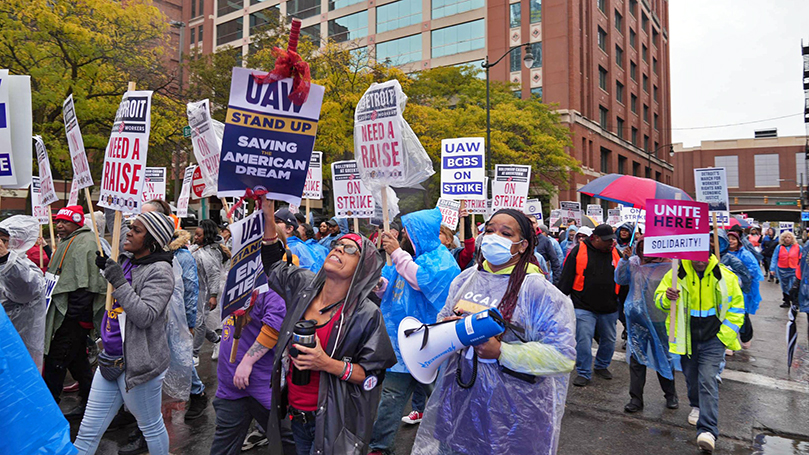
Something is stirring in the land, comrades. Eric went down to the CBTU conference in New Orleans and reported that the whole event was devoted to mobilizing Black, Brown, Asian and white workers for next year’s election. Then he went to the Congressional Black Caucus’ legislative weekend conference where 10,000 participants gathered with the same aims. Laura attended the Women’s Convention in Milwaukee and reported a similar spirit, which was also present at the Coalition of Labor Union Women’s (CLUW) “Hear us roar, getting ready for 2024” conference in Minneapolis.
Then there were the tens of thousands that joined the 60th Anniversary March for civil rights in D.C. and the 75,000 who rallied in New York City to demand Biden end fossil fuels, to say nothing of the hundreds of thousands, if not a million, who are protesting the war in Gaza, demanding a ceasefire, and upholding the right of Palestine to its own state with the right of return.
And yes, we, without question, support that demand. As consistent, working-class internationalists we uphold the Palestinian people’s right to self-determination, to choose their own destiny. We don’t decide what form that choice takes; they do. And our fraternal Palestinian People’s Party and Israeli Communist Party have affirmed time and again their demand for an independent state, alongside Israel. That’s their choice, which we respect. It would be the height of American arrogance to do otherwise. But for that to happen, the hand of U.S. imperialism must be stayed. The first step is a ceasefire. Then negotiations need to begin. And the Biden Administration needs to get out of the way — it’s hardly a neutral party. And therefore we say again: keep the pressure on!
It is so important that the U.S. people are once again rising up to challenge this country’s foreign policy. They’re saying, “We cannot accept a progressive policy at home paid for with a regressive one abroad. We are not for sale.” Indeed, that’s a bargain conceived in the hell of other people’s suffering, including the working-class poor here at home. To paraphrase Dr. King, the bombs dropped abroad are exploding in ghettos and barrios all across the country.
And the truth is, this foreign policy is antithetical to even to the administration’s professed domestic ends. It is undermining its ability to enact the very programs that got it elected in the first place. Take the $1 trillion military budget. The U.S spends more on defense than the next 9 countries combined. And for what? To maintain some fantasy that the U.S. is the planet’s “essential nation,” as the president said in a recent speech? No Mr. Biden! To maintain U.S. imperialism. And to do so, they make the most crude choices. We keep saying it. Last year, the GOP cut the child tax credit that removed 3 million children from poverty. And then nearly the same amount of money was applied to the Defense Department’s budget, over and above what was asked for. And it was done on a bipartisan basis, though with significant Democratic opposition.
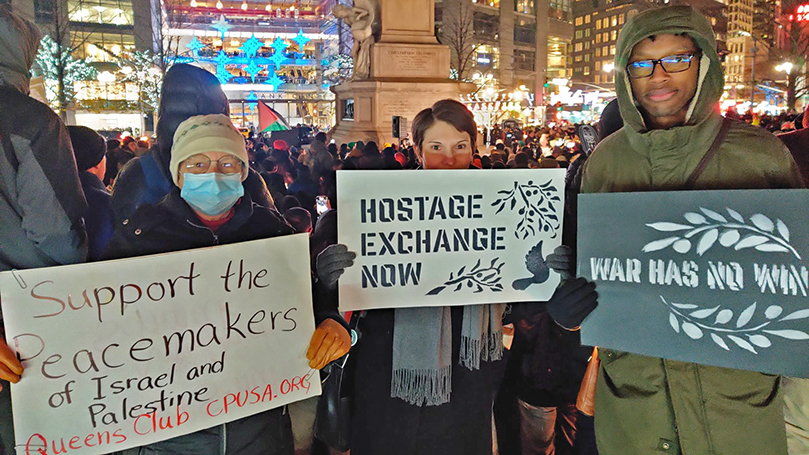
And the only way that’s going to change, short of a social revolution, is by building mass movements on the ground to compel those elected by us to do the right thing. And yes, they have to be compelled, forced to change their policies. And again we keep saying it, every tool in the toolbox must be used: lobbying, demonstrations, rallies, occupations, voting, and yes, if they don’t listen: we do like the autoworkers did, and shut it down. And working-class majorities have to be organized to make this happen. Polls are not enough. In fact, absent united action, polls don’t mean a damn thing. People have to be organized in struggle.
And here the good news seems to be that momentum is shifting towards greater organized struggle. “The crisis of inaction” we’ve talked about, that lull in the people’s movement over the last couple of years, appears to be finally coming to an end. However, it’s too soon to draw firm conclusions. In fact, the political climate is extraordinarily complex, requiring much deeper analysis. We should use the pre-convention discussion period to do just that.
Questions for us to discuss
There are a number of ideological and political issues we need to ponder, like:
- What is the status of the labor movement as a whole today?
- Has the ruling class abandoned the neoliberal economic model, replacing it with neo-Keynesian policy, or is the latter an experimental shift?
- What’s our stance on the potential impact of AI and labor redundancy, in other words, mass unemployment.
- What’s new with respect to the fight against racism and the national question, women’s equality, LGBTQ rights, and the youth question (what we refer to as special questions in Marxism), and how are they impacting the mass radicalization process?
- What is the state of the struggle for democracy, the popular front, and anti-monopoly issues, as they relate to the country’s economic and political crisis? Are other forms of democracy possible under capitalism: advanced democracy? anti-monopoly democracy? To put the question differently, are other forms of rule possible before reaching full-fledged socialism?
- What’s our assessment of environmental issues and the movements that have arisen around them, and their relationship to the struggle for socialism? Some call it eco-socialism. Should we?
- What’s the status of U.S. imperialism in relation to the emergence of what’s called a multi-polar world? Do we accept this concept? What’s the impact of BRICS on the world economy?
- With wars raging in Gaza, Ukraine, Sudan and Congo, what’s our thinking about the national question as it relates to issues of war, peace, and the fight against imperialism?
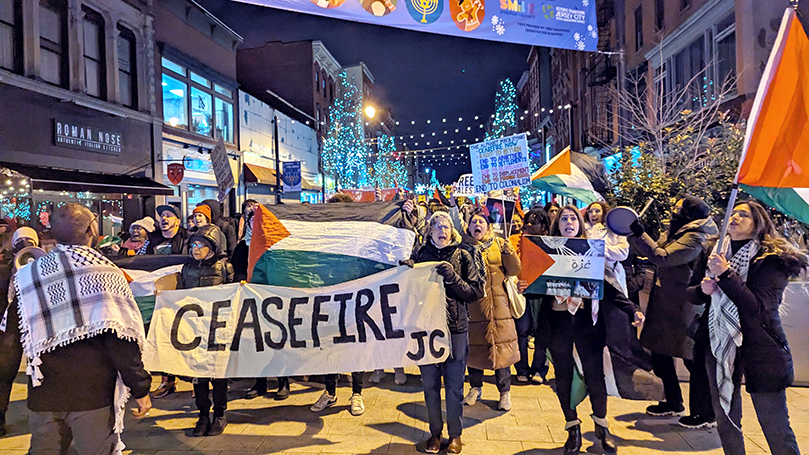
In other words, as we enter our preconvention period, we’ll have to keep our eyes on what is new and developing, issues that will have to be framed in a main political resolution the National Committee (NC) will issue in January to guide our discussion.
Strengthening the party’s foundations
And of course, a big part of what is new for us is the party itself. Since the last convention, a new party is emerging in many districts around the country, with dozens of new clubs and several thousand applicants for membership. And they are playing a wonderful role, revitalizing the party, lending it new life, energy, and experiences.
It is very important that we take into account our new members’ sensibilities and experiences, in other words, their ideological outlook, as we introduce them to ours. With this in mind, over the last year and a half, a partywide discussion has been initiated on the party’s Road to Socialism program. It has consisted of national webinars and schools, along with weekend district and club classes. So far we’ve had a very fruitful discussion. In it, we’ve been reminded that we’re not simply repeating formulas; the program is a living document whose propositions are tested and retested in real life.
Our discussion is a course in the ideological challenges of the moment: how to define fascism and the methods for fighting it, the united and popular fronts and the need for working-class leadership of both, the concept of unity, and the role and nature of the party. It is a conversation that has to account for the new and developing, while also providing instruction on and defending Marxist-Leninist basics. A big challenge, of course, with respect to our electoral policy, is the war in Gaza and the Democratic party’s support for it, which makes the fascist threat all the more dangerous, and the program’s propositions all the more important.
Where held, the program schools have been quite useful. They’ve helped acquaint our membership with our basic positions and also served to introduce the leadership to our new members as we’ve fanned out around the country. Now we’ve got to complete the process, combining it with a basic introduction to how we approach party leadership, both in terms of what it consists of and how we choose it.
While carrying out these ideological tasks, we’ve also worked to rebuild our political and organizational foundations. The party’s real strength can only be measured by its living ties to mass currents and struggles nationally and, most importantly, at the local level. In this regard, we have sought to overcome our relative isolation from mass currents and reconnect with major democratic and working-class movements with varying degrees of success. Where do we stand in this process?
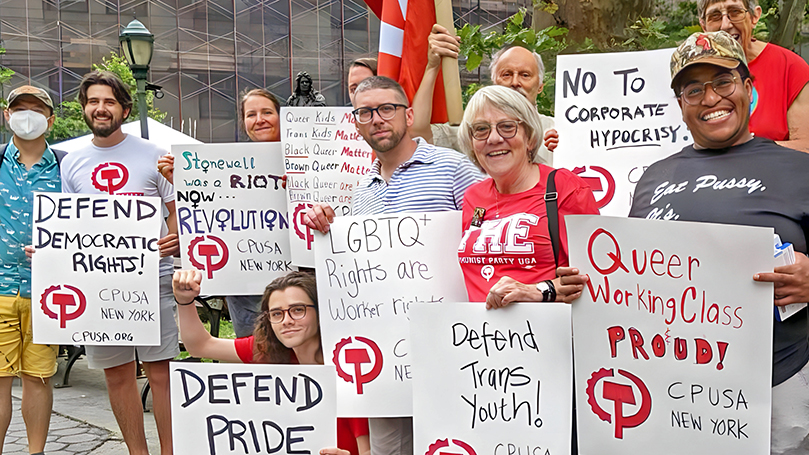
Do we have ties to local central labor bodies, religious communities, city councils, civil rights, women’s, LGBTQ, peace, housing, health care, senior and youth movements? Are we involved in any of the major electoral campaigns that unfolded this year in California, Illinois, Ohio, Pennsylvania, New York and other states around the country, many of which had outstanding candidates and positions on the issues, including candidates like Barbara Lee in California and Brandon Johnson in Chicago? Were we involved in campaigns like the Empowering Communities for Public Safety Ordinance movement (community control of the police), and the abortion rights referendum in Ohio? If we are involved, what are our experiences? If we’re not, why not?
To what extent have we taken initiative on issues like immigration as migrants are being shipped around the country as pawns to score political points in this year’s coming election. In D.C., for example, our party club helped initiate a City Council decision to provide voting rights for the undocumented, and are now working on a Council resolution calling for a ceasefire in Gaza.
Speaking of initiatives, the emergence of a mass peace movement to end the war on Gaza provides us with a unique opportunity to build a mass campaign for a ceasefire, as proposed by our recent peace conference which issued a helpful toolkit.
Stepping up our coalition work
The key issue here is how to build a broad coalition in the area of the club’s or district’s work for a mass campaign. What should be the starting point? Here are some questions to consider:
- What points of discussion will move the club into action? What points of discussion are likely to move allies? Are they the same or different?
- What sample endorsements will be used to develop to promote the campaign? For example, endorsements from trade unions like the UAW, CLUW and various sample resolutions from City Councils, at least 11 of which have passed so far.
- What unions, religious, civil rights, women’s, LGBTQ, climate, community, student and youth organizations in your club area have taken a stand or can be moved to take a stand? Are there Palestinian or other Arab American communities that can be worked with? Are there progressive Jewish individuals and organizations, African American, Latino, or other community groups?
- How can social media campaigns be developed? What slogans are most unifying? What slogans might divide?
- What stands have elected officials and others taken? If none, who are the most likely to begin talking to? If folks are being targeted, that is, attacked for their positions how can we build support for them?
- What grassroots actions can be taken, for example, street tabling with petitions, or door knocking. With the onset of winter, what online initiatives can be taken?
- How can we use articles from peoplesworld.org to promote a ceasefire?
- How can we build relationships with the contacts made in a ceasefire campaign in a strategic way as the 2024 election unfolds?
- And last, but not least, how do we publicize the party club in the process?
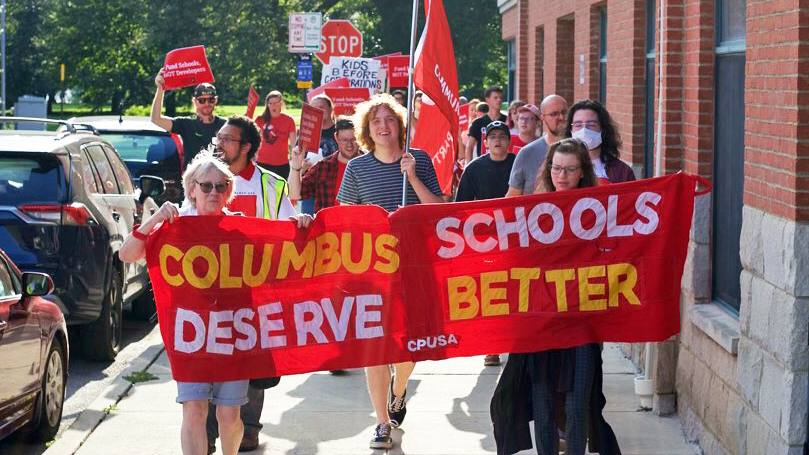
The point is to begin to think through how to take broad initiatives. A starting point is becoming familiar with the lay of the land in our areas of concentration and finding out who’s doing what and when. In this regard, consideration should be given to attending City Council meetings and participating in public hearings. And let’s not forget about school boards or meetings of county commissioners.
Of course, we should continue to participate in mass protests and rallies, while fighting for a ceasefire, including initiating them with others. Leadership means leading in the fight for united front forms of struggle, in other words, in coalition. Revolutionary action and tactics always depend on time, place, and circumstance. Today, it means fighting for non-violent action to involve ever broader working-class masses in struggle.
Militant activities to bring pressure to bear are valid forms of struggle, so long as they are done in broad coalitions with others, with care taken to provide legal and other support if necessary. A question that should always be asked is: Will the tactic used inspire and encourage others to engage in struggle? Care should be taken to avoid isolated, individual acts that lead nowhere and inspire no one — that’s the stuff of anarchism.
Along these same lines, clubs need to think through how to reach working-class communities outside of left circles — that’s where the real action is. Our goal must always have in mind building working-class majorities in support of the issues of the day. In this way, we’ll make the period leading up to the convention one of mass action.
Needless to say, this must include mass electoral action as well. We cannot avoid becoming involved in the 2024 election at the local, state, and yes, the national level. Let’s begin now to think about voter registration drives, ballot initiatives, and candidates on the basis of their stance on the issues. This can and should include running our own candidates where possible. Our party must start now to become a party of initiative and mass action — that includes elections.
Implementing collectivity
Our preconvention period must also work to continue the process of rebuilding the party and deepening Leninist standards of party life, keeping in mind we are one party, with one leadership, united around one policy, based on our party’s program and guided by one worldview: Marxism-Leninism — not Trotskyism, anarchism, or Mao Zedong Thought (with all due respect to comrades in the Communist Party of China). Party membership is premised on this basis.
We are a political party organized in clubs, based on residence, workplace or campus, that meet regularly and collectively interact with, and accept leadership from, district and national bodies, while creatively applying the party program to local circumstances and conditions.
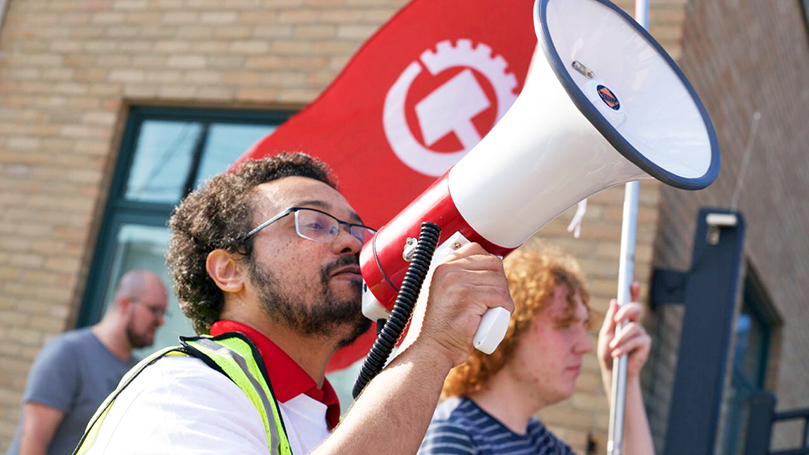
We are a working-class, revolutionary party, organized on the basis of collectivity and democratic centralism, understanding that the former is the first stage in the achievement of the latter.
Democratic centralism means unity and collectivity in decision making as a precondition for unity in action in carrying those decisions out.
Collectivity at the level of decision making without collective implementation represents a rupture in policy. In fact, it arrests inner party democracy and results in standing still. Standing still, in turn, leads to stagnation, along with political and ideological drift, both of which sow the seeds of dissolution. Thus, while collectivity is our super power, that power is only as strong as our ability to make it happen in practice. Once a decision is made, carrying it out is everything.
Needless to say, this means members and clubs need to acquaint themselves with National Committee and National Board decisions, guarantee regularity of meetings, and circulate content from People’s World and CPUSA.org. It means participating in events sponsored by the National Committee, national commissions, and People’s World, both on and offline. It means promoting and encouraging participation in national schools and webinars sponsored by the Education Department.
It also means fighting for, and working with, local collectives of our communist youth once again on the basis of our party program and Marxist-Leninist outlook. Our youth should not be left to their own devices. Every support should be given. That includes meeting with and providing leadership as the YCL grows and develops. This includes guidance and correction of mistakes when necessary. In this regard, an old party adage from Lenin’s toolkit remains valid: “Do not flatter the youth.” In general, party members of YCL age should consider youth work their party assignment. Party members who are in the YCL should consider it their responsibility to fight and implement party policy both in the YCL and in the broader youth movement.
YCL clubs are springing up on campuses all over the country. We congratulate their birth and initiative and must provide every encouragement and support.
Comrades, we are proposing that the preconvention discussion period will begin in February. At that time, the NC will issue a convention call to action, along with a draft resolution. We’re proposing that the NC meet on January 27 to adopt these documents. At that time, we’ll also propose a delegate selection formula, so that the district conventions can be organized. Keep in mind that People’s World will also launch its 2024 fund drive in February. District and clubs should begin to plan now for setting and meeting 2024 fund drive goals.
Thus, next winter and spring promises to be quite busy, as we prepare not only for our convention, but also the November election, both of which require the full involvement of our party.
Images: CP and YCL at the End Fossil Fuels march by Matt Weinstein; Students for Justice in Palestine march through short north (Taylor Dorrell / Anna Hass Morgan Club); The D.C. party club marches for voting rights and D.C. Statehood on MLK Day by DC Communist Party (Twitter); UAW members march through the rain by UAW International Union (Facebook); Queens club celebrating #Chanukah at a #CeasefireNOW rally by Queens club CPUSA (Twitter); Ceasefire activists march in Jersey City, NJ (Hudson–Bergen club, CPUSA); CPUSA members at the 2023 Reclaim Pride Coalition march by Ohio Communist Party USA (Twitter); Columbus party club pickets Pizzuti developers with others, calling for an end to tax handouts by Anna Hass Morgan Club (Twitter); Ibid.

 Join Now
Join Now